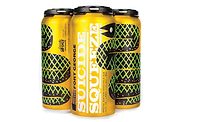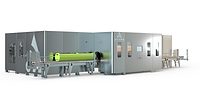Operations
HPP advancements spark beverage innovation
In-bulk HPP opens up technique to new packaging formats

Hiperbaric’s in-bulk HPP machines reduce the number of steps required for the HPP process, resulting in more efficient and more cost-effective operations
(Image courtesy of Hiperbaric USA Corp.)
For more than 20 years, high-pressure processing (HPP) has helped beverage-makers bring fresh, healthy and functional beverages to store shelves. In that span, the industry has grown from operating just 10 machines in 2000 to 130 last year, according to Hiperbaric USA Corp. As a result, 143 million gallons of HPP juices and beverages were produced globally in 2020, says Roberto Peregrina, director of the Miami-based company. Now, pioneering engineering efforts are working to bring this processing technique to even more applications.
After four years of research and development, Hiperbaric launched the Hiperbaric 525 Bulk and Hiperbaric 1050 Bulk HPP machines for large-volume beverage production. Instead of processing bottled beverages, the Hiperbaric 525 Bulk and Hiperbaric 1050 Bulk process beverages in 525-liter and 1,050-liter batches, respectively, before they are transferred to the final packages. This process eliminates the bottle-handling steps of the in-pack HPP process and also removes the packaging restrictions of in-pack machines.
On the Hiperbaric 1050 Bulk machine, the unprocessed beverage first flows into the inlet tank and then is pumped into a bladder in the main vessel to fill 90% of the total vessel volume. Even at the 90% fill level, this offers about double the beverage-processing volume of in-pack HPP machines, the company says. Then, high-pressure intensifiers pump water inside the vessel around the bladder to reach 87,023 pounds per square inch for two to three minutes. Under such conditions, the bacteria, yeasts and mold in the beverage are inactivated, thus extending the shelf life of the product and providing food safety, it says. Once the pressure is released, the beverage is unloaded and buffered in an outlet tank before it is sent to the filling line, where it is loaded into glass bottles, pouches, plastic bottles, cartons, bag-in-box packaging or other vessels. The 1050 Bulk machine can process as much as 10,000 liters, or about 2,640 gallons, an hour.

Image courtesy of Verde Juice
Hiperbaric’s in-bulk HPP technology caught the attention of Alexia Chassagne and Sophie Legros, founders of French fruit and vegetable juice company Juste Pressé. The environmentally conscious beverage-makers saw the in-bulk HPP option as a way to meet their goal of removing all plastic use from their product portfolio by 2023. By working with HPP toller Hermes Boissons in Hermes, France, the juice company was able to release their first HPP juice packaged in a carton this year. Currently Juste Pressé offers a 900-ml carton of HPP juice, and it plans to introduce a 250-ml carton by the end of the year. The leaders say they selected the Pure-Pak Classic 900-ml carton by Elopak Inc., Wixom, Mich., as the carton because it was their most sustainable option. The carton is 93% forest-based, and its cap is made from plant-based materials, according to Elopak. Juste Pressé says this packaging changeover has reduced the company’s carbon emissions by 54% compared with using plastic bottles.
“Hiperbaric HPP in-bulk technology has allowed us to develop a product that is 100% aligned with our brand identity,” the founders said in a statement. “We see this [juice] product as a game-changer in the HPP beverage industry since it provides premium quality and taste with environmentally friendly packaging.”
The in-bulk machine also offers a plethora of other savings, too. “The energy cost per liter of an HPP beverage is cut by almost 50%, as almost twice the volume of juice is processed per cycle, while spare parts and consumable costs per liter are reduced by more than 30%,” Peregrina explains.
In addition, labor costs are cut by about 80% because no manual handling of packages is needed. As a result, total cost of ownership for the Hiperbaric 1050 Bulk is less than half of that of an in-pack machine, the company says.
JBT-Avure Technologies, Erlanger, Ky., is taking these benefits one step further with the recent launch of its FlexiBulk machine. The HPP machine can individually process packaged products and bulk batches simultaneously at filling speeds as fast as 55 gallons a minute. This gives beverage-makers the flexibility to utilize whatever packaging method works best for a given product.
“Ultimately, the FlexiBulk’s capacity, sustainability and flexibility add up to a big win for food and beverage companies, processors, HPP tollers, and consumers,” said Ryan Pereira, president of JBT-Avure, in a statement.
HPP help
For beverage-makers that are unable to afford their own cold-pasteurization equipment, HPP tollers can help beverage companies bring their HPP products to market.
“The investment in HPP equipment is considerable,” explains Tom Woodward, chief commercial officer of Universal Pure, Lincoln, Neb. “It’s not just the large capital outlay for the equipment itself, but there is maintenance to consider, staffing, facility investments to support the equipment and more. The availability of outsourcing offers a lower entry to HPP and flexibility to the brand or beverage manufacturer. More access to HPP through HPP [tollers] … has enabled emerging brands and … companies wishing to focus primarily on their brands the ability to HPP their products without making large capital investments in equipment.”
Demand for HPP tollers has been so high lately that Kelly Egolf, CEO and founder of HPP juice company Verde Juice, launched an HPP tolling business in June. Her new venture, New Mexico Fresh Foods LLC, Albuquerque, N.M., offers HPP services for juices as well as a variety of foods by leveraging JBT-Avure’s AV-M HPP machine.
“COVID[-19] has disrupted restaurant labor severely, causing many restaurant chains to look for ways to reduce the amount of food that must be prepared in house every day,” Egolf explains. “HPP allows restaurant and bar owners to reduce labor demands and save money by buying fresh quality products with greater convenience and less waste. In New Mexico, where premium Margaritas and chips with fresh salsa are key to nearly every restaurant menu, we are seeing a huge increase in the demand for HPP citrus juices, which have all the same quality as fresh-squeezed citrus juice and less headache.”
Egolf says her enterprises are dedicated to growing the local food economy, and when she realized her company could leverage its buying power to support local and organic powers, she expanded her business to include HPP tolling.
“It allows the smaller companies to grow without as much upfront capital investment,” she says.
Expanding applications
The expansion of HPP usage also has supported beverage innovations. Egolf’s Verde Juice is a producer of fresh whole-leaf hemp juice. Its 10-ounce herbal tea and juice blends contain fresh fruits; 12 mg of CBD; and less than 1 mg of THC, the active ingredient in cannabis.
“When it comes to formulating beverages with hemp, HPP is the only way to go in my opinion,” Egolf explains. “Cannabinoids are attracted to the lining of aluminum cans, so customers aren’t actually getting the CBD they are spending money on with canned CBD drinks. HPP … preserves the integrity of heat-sensitive hemp and allows the customer to get the full efficacy advertised on the label. … Without HPP, hemp juice would not be possible.”
HPP also has spurred other new beverage concepts, including HPP cocktail mixers, alcohol beverages, wellness shots and juices with bone broths, explains Mike Billig, vice president of business development at Hydrofresh HPP, Delphos, Ohio. The processing method also has enabled beverage-makers to work with unique ingredients, like vinegar, tart cherry and ginger.
“[HPP] allows beverage manufacturers to develop premium products not achievable through other processing methods but that can command a premium price in the marketplace,” he says.
Billig predicts that these emerging product concepts along with cold-pressed juices, nut milks, oat milks, cold-brewed coffees, teas and yogurt drinks will be the most likely products to take advantage of HPP technology going forward.
As the demand for natural, healthy and preservative-free beverages grows, experts at JBT-Avure predict that the use of HPP will grow, too.
“The expansion into more targeted health-based products, such as nutraceutical and clinically formulated products for at-risk populations, will drive the adoption of HPP technology in the food and beverage industry,” says Errol Raghubeer, vice president of HPP and technology for JBT-Avure. “The demand for immune-boosting beverages in particular has increased significantly during the COVID-19 pandemic. The need to maintain a strong immune system is likely to stay long after the pandemic is over, with not only healthy beverages meeting that need but other nutraceutical, health-based HPP beverage products.”
Looking for a reprint of this article?
From high-res PDFs to custom plaques, order your copy today!






